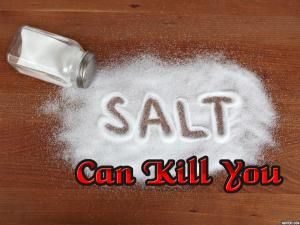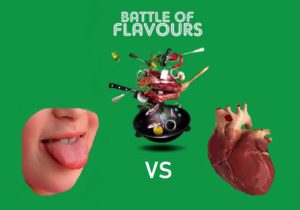
Big Salt and Big Food don’t want you to know the truth about how dangerous dietary salt really is. They use all sorts of tactics to confuse and mislead the public, so that the salt industry can continue making huge profits, and the food industry can continue producing cheap processed foods that rely on salt for flavour, rather than using natural ingredients (for instance, McDonald’s Big Mac contains 2.3 grams of salt 1 and a can of Baxter’s Cream of Tomato soup contains 2.6 grams 2 ): resulting not only in salt addiction, but also potentially in years of ill health and an early grave for their unwitting consumers.
Blog Contents
Is BIG Salt’s power at causing research bias just a Big Exaggeration?
Not at all. There’s plenty of evidence 3 that when research fails to show a positive and clear relationship between increased salt consumption and increased health risks (including higher blood pressure, cardiovascular events and CVD deaths), there’s likely to be outside funding or outside pressure from Big Salt in one way or another – either directly, through financial bribes (they call it ‘funding’) or through having biased parties involved either in the research studies themselves 4 5 or in the organisations/companies responsible for the publication of the research results 6 7 , who may themselves move through a revolving door 8 between scientific research and working as senior executives within the salt industry. Same scenario as we see with Big Food 9 , Big Tobacco 10 and Big Pharma 11 .
So, amongst all this confusion, where vested interests play such a major role, and where so many people are virtually addicted to the current high levels of salt in packaged, restaurant and take-away foods, is there any research data that proves definitively that salt intake is causally related to serious increased health risks?
Indeed there is.
Evidence that salt in harmful
Two major long-term studies (Trials of Hypertension Prevention (TOHP), phases I 12 and II 13 ) followed two groups of randomly selected pre-hypertensive individuals for many years. They collected multiple 24-hour urine specimens from these participants during the testing period, to check sodium excretion. They then kept up surveillance after the trials to monitor whether there were any significant differences between the health outcomes of the two groups – those who had lower levels and those who had higher levels of dietary salt intake.
The results
A 2014 review 14 of these two earlier TOHP I & II studies, presented the following data:
- 193 cardiovascular events or CVD deaths occurred among 2275 participants not in a sodium reduction intervention with 10 (TOHP II) or 15 (TOHP I) years of post-trial follow-up, representing:
- a linear 17% increase in risk per 1000 mg/24hr (that is, for every extra gram of salt within a 24 hour period, you increase your risk of cardiovascular events or CVD death by 17%)
The reviewers concluded that: “Results from the TOHP studies, which overcome the major methodological challenges of prior studies, are consistent with overall health benefits of reducing sodium intake to the 1500 to 2300 mg/day range in the majority of the population, in agreement with current dietary guidelines.”
What are the daily salt intake recommendations?
A teaspoon contains 5.69 grams of salt (sodium chloride) 15 , which equates to around 2.3 grams (2300 mg) of sodium.
The World Health Organisation (WHO) recommends 16 less than 5 grams of salt per day for adults (less for children).
The UK National Health Service (NHS) recommends 17 about the same as WHO.
The US Food & Drug Administration (FDA) also recommends 18 about the same as WHO.
Remember, that a teaspoon of salt is not in addition to the salt that’s already in the prepared food you buy – and if you eat prepared meals, soups, sauces etc and jot down the amounts of all the added salt within them, you might be shocked by just how much salt you’re consuming each day.
But how much salt is really too much?
It may be comforting to follow the above recommendations if you simply believe that you can get away with only a teaspoon or so of salt a day; but there’s good reason why I and other non-SOS WFPB advocates suggest that it’s best to aim for zero added salt (and that includes the stuff hidden in prepared foods and sauces).
In his book How Not To Die 19 , Dr Michael Greger says:
“Many so-called low-salt diets can actually be considered high-salt diets. That’s why it’s critical to understand what the concept of “normal” is when it comes to sodium. Having a “normal” salt intake can lead to a “normal” blood pressure, which can contribute to us dying from all the “normal” causes, like heart attacks and strokes 20 .”
But what’s normal salt intake for humans?
You can answer this by talking about the modern 21st century diets, or you can look back hundreds or thousands of years to times before salt was being used at all for preserving or flavouring foods. No doubt there would be similar controversy about distant historical facts, just as there is when discussing Paleo diets. What we ideally need is a modern population which eats the low levels of salt that pre-industrialised humans would most likely have eaten. And, luckily enough, we have one: the Yanomamo Indians in the Amazon rainforest.

These people have the lowest sodium intake ever recorded 21 . The researchers found that the blood pressures of the older Yanomamo were the same as those of adolescents 20 . They start out as children with an average blood pressure of around 100/ 60 and this optimally healthy blood pressure level remains the same for their whole lives, into old age. Indeed, researchers failed to find a single case of high blood pressure among their whole population 21 .
To decide whether other lifestyle factors (such as increased exercise) confound the results, you’d need to ensure that other factors were removed from the final measurements. Whilst I have no current research data specifically on the Yanomamo Indians, a 2001 Finnish study 22 prospectively followed 1173 Finnish men and 1263 women with complete data on 24 h urinary sodium excretion and cardiovascular risk factors. The researchers concluded that: “High sodium intake predicted mortality and risk of coronary heart disease, independent of other cardiovascular risk factors, including blood pressure. These results provide direct evidence of the harmful effects of high salt intake in the adult population.”
Vegan Food Is No Exception
And don’t think that just by eating vegetarian or vegan food you’re going to avoid excess salt. A BBC News article 23 reported that “More than a quarter of meat-free burgers, sausages and mince tested for a study exceed maximum recommended salt levels.”
So, unless you either cook the food from scratch yourself, you may find that pre-packed and restaurant vegan/vegetarian fare is just as likely to be over-salted as meat-based offerings.
Final thoughts
With the Yanomamo Indians, no processed foods were being consumed and no salt was being added to meals. That’s just what’s recommended in the non-SOS WFPB diet – no salt, oil or sugar being added (by food manufacturers or by ourselves) to the plant foods we eat.
Some healthy alternatives to salt have been covered in previous blogs 24 25 26 . One of the great benefits to getting free from the salt addiction is that you develop a much more sensitive palate for the natural flavours within natural food – yes, it may take a while to make the transition, and I know it’s not an easy thing to wean ourselves off the high (normal?!) levels of added salt to which we have become accustomed; but if you want to do the very best you can to maintain optimum cardiovascular health, the salty solution rests in what’s more important to you – tempting taste or healthy heart…

References
- The telegraph: Scandal of high salt levels in sandwiches at Britain’s coffee shops [↩]
- Express: HEALTH WARNING: High salt levels in shop-bought soup could contribute to STROKE risk [↩]
- The Conversation: Best to ignore salt claims from studies using unsavoury data [↩]
- Am J Hypertens. 2014 Sep;27(9):1129-37. doi: 10.1093/ajh/hpu028. Epub 2014 Mar 20. Compared with usual sodium intake, low- and excessive-sodium diets are associated with increased mortality: a meta-analysis. Graudal N, Jürgens G, Baslund B, Alderman MH. [↩]
- Curr Hypertens Rep. 2013 Dec;15(6):687-93. doi: 10.1007/s11906-013-0389-5. An update on the salt wars-genuine controversy, poor science, or vested interest? Neal B, Land MA, Woodward M. [↩]
- Am J Hypertens. 2014 Nov; 27(11): 1424. Published online 2014 Sep 25. doi: 10.1093/ajh/hpu095. Salt Intake and Mortality. Feng J. He, Graham A. MacGregor. [↩]
- ICMJE – Conflicts of Interest. [↩]
- Food Politics by Marion Nestle: Currently browsing posts about: Salt. Food industry lobbyists running the dietary guidelines? [↩]
- HEALTH NEWS FROM NPR: A Look At How The Revolving Door Spins From FDA To Industry [↩]
- TPD – Revolving door between tobacco industry and the EU: Revolving Door Cases [↩]
- KHN: Big Pharma Greets Hundreds Of Ex-Federal Workers At The ‘Revolving Door’ [↩]
- Ann Epidemiol. 1991 Aug;1(5):455-71. Trials of hypertension prevention. Phase I design. Satterfield S1, Cutler JA, Langford HG, Applegate WB, Borhani NO, Brittain E, Cohen JD, Kuller LH, Lasser NL, Oberman A, et al. [↩]
- Ann Epidemiol. 1995 Mar;5(2):156-64. Trials of Hypertension Prevention, phase II. Structure and content of the weight loss and dietary sodium reduction interventions. Trials of Hypertension Prevention (TOHP) Collaborative Research Group. Lasser VI, Raczynski JM, Stevens VJ, Mattfeldt-Beman MK, Kumanyika S, Evans M, Danielson E, Dalcin A, Batey DM, Belden LK, et al. [↩]
- Circulation. Author manuscript; available in PMC 2015 Mar 4. Lower Levels of Sodium Intake and Reduced Cardiovascular Risk [↩]
- Traditional Oven: table Salt Conversion [↩]
- WHO Key Facts: Salt [↩]
- NHS: Salt – The Facts [↩]
- FDA – Salt Recommendations [↩]
- Greger, Michael; Stone, Gene. How Not To Die: Discover the foods scientifically proven to prevent and reverse disease (Air Side Edt) (p. 124). Pan Macmillan. Kindle Edition [↩]
- Celermajer DS, Neal B. Excessive sodium intake and cardiovascular disease: a-salting our vessels. J Am Coll Cardiol. 2013;61( 3): 344– 5. [↩] [↩]
- Mancilha-Carvalho J de J, de Souza e Silva NA. The Yanomami Indians in the INTERSALT Study. Arq Bras Cardiol. 2003;80( 3): 289– 300. [↩] [↩]
- Lancet. 2001 Mar 17;357(9259):848-51. Urinary sodium excretion and cardiovascular mortality in Finland: a prospective study. Tuomilehto J, Jousilahti P, Rastenyte D, Moltchanov V, Tanskanen A, Pietinen P, Nissinen A. [↩]
- BBC News: Vegetarian meat substitutes ‘exceeding salt limits’ 23 October 2018 [↩]
- How To Get Flavour Without Adding Salt [↩]
- WFPB – Food Substitutions [↩]
- Great Spices for a WFPB Diet [↩]